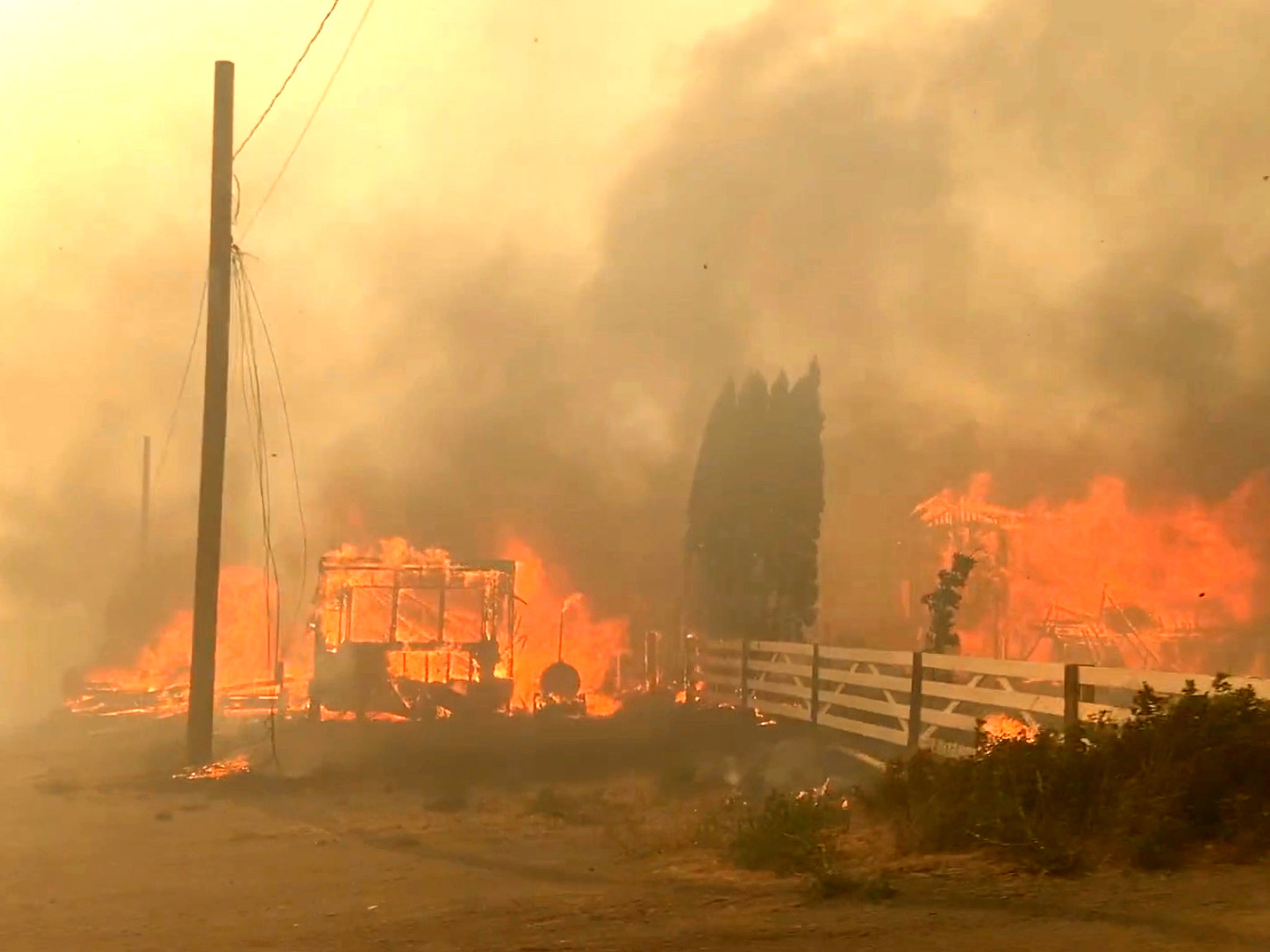Lytton fire: New clues in hunt for cause of blaze that wiped a whole town off the map
‘An entire village has been affected – the bank, the supermarket, the post office, everything. So it’s really important to get this one right’

As investigations into a fire that destroyed almost an entire village in Canada’s British Columbia continue, authorities believe humans are to blame for the devastating blaze.
A fire razed 90 per cent of the village of Lytton on June 30, just days after it broke the record for Canada’s all-time highest temperature for three days in a row, reaching 121.1F (49.5C). At least two people died in the fire and more than 1,000 people were evacuated.
Meteorologists say the unprecedented conditions are being caused by a “heat dome” over western Canada and parts of the US Pacific northwest.
A heat dome is an unofficial term given to an area of hot air high up in the atmosphere that lingers over an area for a prolonged period of time, trapping in heat below.
About 200 wildfires are currently raging across British Columbia, due to the extreme heat.
While a wildfire is currently burning in the area, at Lytton Creek, this is not believed to have been responsible for the blaze that destroyed the town.
Now, investigators are working through social media rumours and witness reports to determine what exactly did cause it.
Several social media users reported seeing sparks flying from train brakes before the fire broke out on Wednesday, near Canadian National (CN) Railway’s main line through Lytton. One video being circulated on social media shows a smoking train travelling through the area.
However, authorities are attempting to tamp down the social media rumours, saying that investigations into the cause of the Lytton village fire are still ongoing.
Thompson-Nicola Regional District chief administrative officer Scott Hildebrand said the train being the origin of the fire was “certainly not our view”.
“That information is unconfirmed and we are investigating,” Mr Hildebrand said.
“I do know for a fact though, that the fire in Lytton had nothing to do with the wildfire that was in that area.”
The BC Wildfire Service and the Royal Canadian Mounted Police (RCMP), who are working together on the investigation into the fire, both say it was likely caused by human activity.
“At this time, it’s suspected to be human-caused, but that investigation is still ongoing,” BC Wildfire Service fire information officer Forrest Tower says.
He would not be drawn on social rumours pointing to the train as the cause of the fire, saying investigators remain “tight lipped” on that. He could not give a definite time frame on when the investigation would be concluded, but expected it to take “weeks to months”.
“This has almost never happened in BC before, where an entire village has been affected – the bank, the supermarket, the post office, everything. So it’s really important to get this one right.”
Staff sergeant Janelle Shoihet, senior media relations officer at the Royal Canadian Mounted Police, says “the investigation is a priority and remains active and ongoing. We have no timeline on how long it will take, but it will be thorough”.
The RCMP is urging witnesses who were in the area of Lytton at the time of the fire to contact police, and is working to determine if the train fire had caused the fire or not.
“We are aware of the witnesses related to the train however we will not speculate as to whether this is a cause or effect, i.e. was the train on fire before the wildfire began or did it catch on fire as a result of the fire? We will allow the evidence to guide our investigation as it progresses.”
Canadian Pacific (CP) Railway and Canadian National Railway both operate train services through Lytton. The route is a critical transportation route for the movement of goods across Western Canada and the rest of the continent.
It wouldn’t be the first time CN was responsible for a fire in the area; last year, the company was fined $16.6 million in damages for causing a wildfire 10 kilometres south of Lytton in 2015. The Cisco Road wildfire destroyed 2,200 hectares of land. An investigation concluded that rail workers cutting a line near the tracks sparked the blaze, which burned for four months and resulted in several evacuations.
CN says they are providing “full assistance” to investigators into the cause of the fire. In a statement, the company said: “The tragic events in Lytton are deeply distressing and we are very concerned for the safety of residents. CN representatives will work closely with the community and Lytton First Nation in the recovery from this devastating event.”
CP resumed operations through the area on Monday, following safety inspections of the tracks and infrastructure.
The Transportation Safety Board of Canada said they had not received a report from CN or CP on the incident so it was not investigating the matter at this time.
“The TSB is monitoring the current situation and is ready to follow up if an occurrence report is received.”
Subscribe to Independent Premium to bookmark this article
Want to bookmark your favourite articles and stories to read or reference later? Start your Independent Premium subscription today.

Join our commenting forum
Join thought-provoking conversations, follow other Independent readers and see their replies